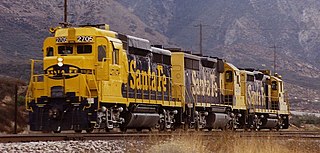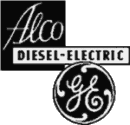Related Research Articles

The American Locomotive Company was an American manufacturer of locomotives, diesel generators, steel, and tanks that operated from 1901 to 1969.

A diesel locomotive is a type of railway locomotive in which the prime mover is a diesel engine. Several types of diesel locomotives have been developed, differing mainly in the means by which mechanical power is conveyed to the driving wheels.

The Baldwin Locomotive Works (BLW) was an American manufacturer of railroad locomotives from 1825 to 1951. Originally located in Philadelphia, it moved to nearby Eddystone, Pennsylvania, in the early 20th century. The company was for decades the world's largest producer of steam locomotives, but struggled to compete as demand switched to diesel locomotives. Baldwin produced the last of its 70,000-plus locomotives in 1951, before merging with the Lima-Hamilton Corporation on September 11, 1951, to form the Baldwin-Lima-Hamilton Corporation.

GE Transportation is a division of Wabtec. It was known as GE Rail and owned by General Electric until sold to Wabtec on February 25, 2019. The organization manufactures equipment for the railroad, marine, mining, drilling and energy generation industries. The company was founded in 1907. It is headquartered in Pittsburgh, Pennsylvania, while its main manufacturing facility is located in Erie, Pennsylvania. Locomotives are assembled at the Erie plant, while engine manufacturing takes place in Grove City, Pennsylvania. In May 2011, the company announced plans to build a second locomotive factory in Fort Worth, Texas, which opened in January 2013.

Montreal Locomotive Works (MLW) was a Canadian railway locomotive manufacturer which existed under several names from 1883 to 1985, producing both steam and diesel locomotives. For a number of years it was a subsidiary of the American Locomotive Company. MLW's headquarters and manufacturing facilities were located in Montreal, Quebec.

The GE U25B was General Electric's first independent entry into the United States domestic road switcher diesel-electric locomotive railroad market for heavy production road locomotives since 1936. From 1940 through 1953, GE participated in a design, production, and marketing consortium (Alco-GE) for diesel-electric locomotives with the American Locomotive Company. In 1956 the GE Universal Series of diesel locomotives was founded for the export market. The U25B was the first attempt at the domestic market since its termination of the consortium agreement with Alco.

General Motors Diesel was a railway diesel locomotive manufacturer located in London, Ontario, Canada. It was established in 1949 as the Canadian subsidiary of the Electro-Motive Diesel division of General Motors (EMD). In 1969 it was re-organized as the "Diesel Division of General Motors of Canada, Ltd." The plant was re-purposed to include manufacture of other diesel-powered General Motors vehicles such as buses. Following the Canada-United States Free Trade Agreement in 1989, all of EMD's locomotives were built at the London facility. In 2005 new owners of EMD renamed the Canadian subsidiary "Electro-Motive Canada". The plant was closed by EMD's new owner Progress Rail in 2012, with EMD's production remaining in LaGrange, Illinois and Muncie, Indiana.

The EMD GP30 is a 2,250 hp (1,680 kW) four-axle diesel-electric locomotive built by General Motors Electro-Motive Division of La Grange, Illinois between July 1961 and November 1963. A total of 948 units were built for railroads in the United States and Canada, including 40 cabless B units for the Union Pacific Railroad.

The ALCO RS-3 is a 1,600 hp (1.2 MW), B-B diesel-electric locomotive manufactured from May 1950 to August 1956 by American Locomotive Company (ALCO) and its subsidiary Montreal Locomotive Works (MLW). A total of 1,418 were produced: 1,265 for American railroads, 98 for Canadian railroads, 48 for Brazilian railroads, and seven for Mexican railroads.

The EMD NW5 was a 1,000 hp (750 kW) road switcher diesel-electric locomotive built by General Motors Electro-Motive Division of La Grange, Illinois between December 1946 and February 1947.

The ALCO PA was a family of A1A-A1A diesel locomotives built to haul passenger trains. The locomotives were built in Schenectady, New York, in the United States by a partnership of the American Locomotive Company (ALCO) and General Electric (GE) between June, 1946 and December, 1953. Designed by General Electric's Ray Patten, they were of a cab unit design; both cab-equipped lead A unit PA and cabless booster B unit PB models were built. While externally the PB models were slightly shorter than the PA model, they shared many of the same characteristics, both aesthetically and mechanically. However, they were not as reliable as EMD E-units.
Progress Rail Locomotives, doing business as Electro-Motive Diesel (EMD), is an American manufacturer of diesel-electric locomotives, locomotive products and diesel engines for the rail industry. The company is owned by Caterpillar through its subsidiary Progress Rail.

Alco-GE was a partnership between the American Locomotive Company and General Electric that lasted from 1940 to 1953. Their main competitor was EMD.

The ALCO RS-2 is a 1,500–1,600 horsepower (1,100–1,200 kW) B-B diesel-electric locomotive built by the American Locomotive Company (ALCO) from 1946 to 1950. ALCO introduced the model after World War II as an improvement on the ALCO RS-1. Between 1946 and 1950, 377 examples of the RS-2 were built, primarily for American and Canadian customers.

A boxcab, in railroad terminology, is a locomotive in which the machinery and crew areas are enclosed in a box-like superstructure. It is a term mostly used in North America while in Victoria (Australia), such locomotives have been nicknamed "butterboxes". Boxcabs may use any source of power but most are diesel or electric locomotives. Few steam locomotives are so described but the British SR Leader class was a possible exception. Most American boxcabs date from before World War II, when the earliest boxcabs were often termed "oil-electrics" to avoid the use of the German name "Diesel" due to propaganda purposes.

The ALCO RS-3m is a diesel-electric locomotive rebuilt from an ALCO RS-3 road switcher. These 98 locomotives were rebuilt to replace their original ALCO prime mover with the more reliable EMD 567B engine and fan assemblies taken from retired E8s. Many of these rebuilds were performed by the ex NYC DeWitt shop with 56 completed at the ex PRR Juniata shop. The RS3m rebuild program started in 1972 and continued until 1978 under Conrail.
Maine Central Railroad began operating diesel locomotives in 1935, and had retired all steam locomotives by 1954. That time interval was a joint operating period with the Boston and Maine Railroad (B&M). This article describes diesel locomotives owned by Maine Central through the period of joint operation and later independent operation prior to Guilford Rail System control in 1981.
The ALCO 241 was a diesel prime mover built by the American Locomotive Company (ALCO). It was the company's first diesel engine originally designed to power road locomotives, with a higher output and operating speed than previous designs.

The Indian locomotive class YDM-5 is a class of diesel-electric locomotive that was developed in 1964 by General Motors (GM-EMD) for Indian Railways. The model name stands for Metre gauge (Y), Diesel (D), Mixed traffic (M) engine, 5th generation (5). They entered service in 1964. A total of 25 YDM-5 locomotives was built between 1963 and 1964.

The Indian locomotive class YDM-3 is a class of diesel-electric locomotive that was developed in 1964 by GM-EMD for Indian Railways. The model name stands for Metre gauge (Y), Diesel (D), Mixed traffic (M) engine, 3rd generation (3). They entered service in 1962. A total of 30 YDM-3 locomotives was built between 1961 and 1962.
References
- ↑ "Perry Egbert" . Retrieved December 25, 2020.
- ↑ "Perry Egbert Papers". Syracuse University. Retrieved 25 Jan 2013.
- ↑ {{cite web Perry |url=http://utahrails.net/articles/alco-v-emd.php |title=ALCo vs EMD |publisher=UtahRails.Net |accessdate=25 Jan 2013 }}